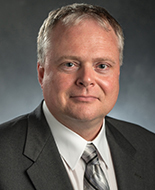
Thomas Glasmacher, FRIB Laboratory Director, 2021-22 mentor for AAN Leadership Fellows
As FRIB Laboratory Director, Thomas Glasmacher is the responsible administrator for the 630-employee FRIB Laboratory, which is equivalent to a college within Michigan State University. He also has full responsibility and authority to execute the FRIB Project. This includes overall line management responsibility, the design, construction, and transition to operations of FRIB, the management of all contractors, and ensuring the full project scope is delivered in a safe, cost-efficient, and environmentally responsible manner.
Thomas joined the National Superconducting Cyclotron Laboratory at MSU in 1992 as an NSCL Fellow and performed research in intermediate energy nuclear physics. In 1995 he joined the MSU faculty in the Department of Physics and Astronomy and NSCL, where he is now a University Distinguished Professor. His research resulted in more than 200 publications and focused on exploring the structure of rare isotopes with new experimental techniques involving gamma-rays. This work was recognized in 2006 with the Sackler Prize in the Physical Sciences.
From 2003-2009, Thomas was the associate director for operations at NSCL. In 2008 he led the team that prepared the winning FRIB proposal. He became the FRIB Project Director when the Cooperative Agreement between the U.S. Department of Energy (DOE) and MSU was signed in June 2009. He built the FRIB Project team and successfully led the team through conceptual design and alternative selection (Critical Decision 1), preliminary design and baselining (Critical Decision 2), final design, and into construction (Critical Decision 3a and 3b). FRIB is baselined at a total project cost of $730 million and set for completion in June 2022. FRIB Project completion date (Critical Decision 4) is June 2022, managing to early completion in December 2021 and start of user operation in early 2022.
Thomas was a member of the Nuclear Science Advisory Committee from 2004-2007, is a Fellow of the American Physical Society, a Fellow of the American Association for the Advancement of Science, and is a Stanford Certified Project Manager.
Thomas earned MS (1990) and PhD (1992) degrees in low-energy experimental nuclear physics from Florida State University.

